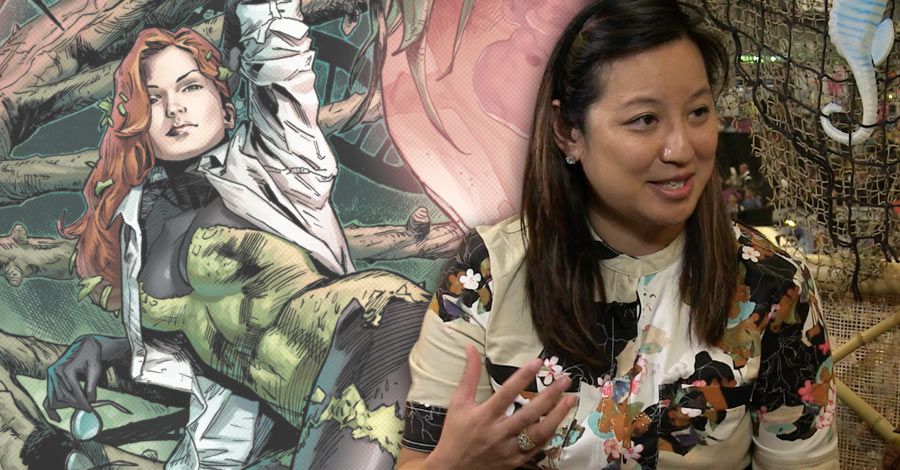Longtime Batman villain Poison Ivy is hard to define. She's run the gamut from villain to hero and back and again, and while many know of the plant-based DC Comics character, few truly know who Dr. Pamela Isley is, something the January debut of "Poison Ivy: Cycle of Life and Death" will attempt to change.
Fittingly, the writer tasked with bringing a new light to Ivy is hard to define as well. After gaining recognition for the self-published "Girls Night Out" anthologies, Amy Chu shot straight to the big leagues at Vertigo Comics with stories featured in "Vertigo Quarterly CMYK" and "Strange Sports Stories." January's "Poison Ivy" miniseries will put her on the biggest stage yet, but much like she doesn't want to define the character in any concrete way, she doesn't want to do the same for the kinds of stories she's interested in telling.
At New York Comic Con, CBR TV's Joseph Illidge welcomed Chu to the world famous CBR Tiki Room to discuss her career both past and present. In addition to discussing Chu's take on the fan-favorite Batman character, she discusses her work on the "DMC" comic in creating new hero LAK6, what it was like to make her mark at Vertigo, and whether the industry's push for diversity has yielded more good or bad for her as a writer.
In part one of her interview with CBR TV, writer Amy Chu covers a broad range of topics including her upcoming "Poison Ivy" miniseries at DC Comics that will attempt to flesh out and explore the hero/villain/anti-hero -- without trying to leave readers with a definitive statement of who she is. Chu also talks about her involvement with the "DMC" comic from Darryl Makes Comics, developing new Latina hero LAK6, and what it was like to start her writing career with stories at Vertigo Comics.
On trying to figure out all of Ivy's many layers and whether she's a hero or villain:
Amy Chu: I think it's all about discovery. I don't think anyone knows who Poison Ivy is. I don't think Poison Ivy herself knows who she is because she's caught between two worlds, right, human and plant. She's always kind of the perpetual outsider. A lot of it for me, and generally when I write I do a lot of research. I don't ever really come in and say, "I know the core of this character," unless it's me -- and even me, I don't know who I am, right? [Laughs] Do you know who you are? I think what's important in the story is we come to understand the character, but a character also has to change over the course of a good story, that's super important. So to answer your question, I don't think of it as, "Yeah, I know exactly who she is." Plus, this is like a whole new thing. It's a whole new Ivy world.
On whether the miniseries is meant to be a definitive statement about who Poison Ivy is:
It's really interesting, and maybe this is a gender thing, but I don't think I need to make my mark. For me this is all about let's discover together. Let's give her -- she's a character that everyone seems to know but we don't have much on her, so this is like a wonderful opportunity to develop that backstory of who she is as a person, and as a plant. [Laughs] A person-plant.
After discussing a diversity in comics panel she recently participated in, Chu weighs in on whether the industry's attempt to create more diverse creators and readers has helped or hurt her career, as well as offering some advice to those still trying to break in. She also discusses which of her stories best exemplify her as a writer, the benefit she gained from Comics Experience classes and her side hustle as a donut connoisseur.
On whether she feels the focus on diversity and female creators has benefitted her career:
I think it makes things complicated. I don't want to say I benefitted or didn't benefit because in some ways it's really a problem, and in some ways it does give you opportunities. It's how you approach it, I think. In some ways it's easy to get discouraged. It's easy to get discouraged breaking into comics, period. [To avoid that], you don't think about it. [Laughs] 'Cause I'm a machine. I am goal-oriented. If you tell me I can't do something then I'm like, "I'm doing it." I figure a way to do it, which means self-publishing. I can't get in this door, I'll self-publish. If it's good, people will see it.
On what she enjoys most about comics and collaboration:
Comics is collaboration, so I could talk about my "Girls Night Out" anthologies; that's a way I can work with artists and figure out how do I work in terms of a style, in terms of short stories and experimentation. That's the exciting thing about comics. We forget that comics is a passion, and it's a collaboration. It's a way I get to work with my friends and say, "Hey. Have you ever done sci-fi? Let's do a short story sci-fi together. Let's do action together." That's the fun part of comics. And sometimes you don't get that in work for-hire; you're given a mandate. This way I get to do and I hope people -- these are characters people haven't heard of, they're their own characters. It's a harder sell but on a artistic experimentation level it's more fun.
I will write anything. What I think is important is a good story. The trappings of it, whether it happens in space or in Hell or whatever. It's the story. The Coen Brothers do that all the time. You see it's a genre piece but the core is a real story. That's what's important to me.

